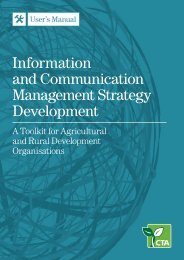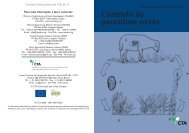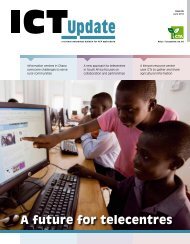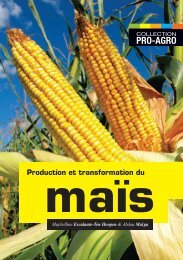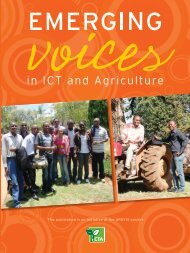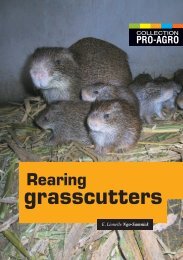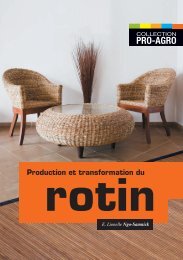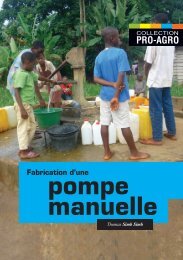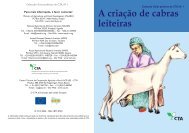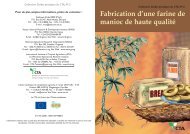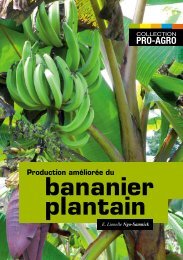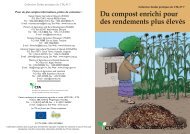Policy framework for Pastoralism in Africa
Policy framework for Pastoralism in Africa
Policy framework for Pastoralism in Africa
- No tags were found...
You also want an ePaper? Increase the reach of your titles
YUMPU automatically turns print PDFs into web optimized ePapers that Google loves.
1. Introduction1.1 The case <strong>for</strong> a pan-<strong>Africa</strong>n <strong>Policy</strong> Framework <strong>for</strong> <strong>Pastoralism</strong>1.1.1 Background<strong>Pastoralism</strong> is a way of life based primarily on rais<strong>in</strong>g livestock, particularly small rum<strong>in</strong>ants, cattleand camels. Pastoral livestock production systems are mostly found <strong>in</strong> <strong>Africa</strong>’s vast arid and semiaridareas. These areas are characterized by marked ra<strong>in</strong>fall variability, and associated uncerta<strong>in</strong>ties<strong>in</strong> the spatial and temporal distribution of water resources and graz<strong>in</strong>g <strong>for</strong> animals. Pastoralistshave developed management systems based on strategic mobility, which are well-adapted to thesedifficult conditions. Although <strong>Africa</strong>n pastoral ecosystems are ancestral homeland to a substantialportion of the population <strong>for</strong> whom pastoralism is a traditional way of life, pastoralism is far fromstatic. Pastoralists <strong>in</strong> many areas are adapt<strong>in</strong>g to trends such as new economic opportunities andbetter access to modern means of communication.The socioeconomic importance of <strong>Africa</strong>n pastoralism stems from the follow<strong>in</strong>g facts:i. pastoral areas occupy about 40 percent of <strong>Africa</strong>’s land mass, albeit with significant variationsbetween countries;ii. livestock or livestock-related activities contribute at least 50 percent of total value of marketedproduction and subsistence production consumed by an average pastoralist household;iii. <strong>in</strong> general, pastoral areas are less suitable <strong>for</strong> crop husbandry, and livestock production rema<strong>in</strong>sthe most viable opportunity to harness scarce biomass resources;iv. pastoralists are custodians of key national resources found <strong>in</strong> arid and semi-arid areas and asa system, pastoralism helps to protect and safeguard these resources.Pastoralist communities generally live <strong>in</strong> isolated, remote and underdeveloped areas. These areas areoften conflict prone, food <strong>in</strong>secure and associated with high levels of vulnerability. Service provision<strong>in</strong> pastoral areas is usually less-well developed than <strong>in</strong> other areas, with low health and education<strong>in</strong>dicators than national-level figures. As <strong>in</strong> other areas of <strong>Africa</strong>, population growth is also driv<strong>in</strong>gchanges <strong>in</strong> pastoral areas and <strong>in</strong> some cases, <strong>in</strong>creas<strong>in</strong>g levels of vulnerability and destitution.The mandate of the Department of Rural Economy and Agriculture of the <strong>Africa</strong>n Union Commission(AU/DREA) is to <strong>in</strong>itiate and promote policies that can contribute to the development of ruraleconomy and improve livelihoods through <strong>in</strong>creas<strong>in</strong>g agricultural productivity, ensur<strong>in</strong>g foodsecurity, and enhanc<strong>in</strong>g susta<strong>in</strong>able use and management of <strong>Africa</strong>’s natural resources. Compliantwith this mandate, and cognizant of the challenges and opportunities <strong>for</strong> <strong>Africa</strong>’s pastoral areas,AU/DREA has been support<strong>in</strong>g a series of programs and projects designed to improve the healthand productivity of animal resources <strong>in</strong> <strong>Africa</strong>, ma<strong>in</strong>ly through its specialised technical office, theInter-<strong>Africa</strong>n Bureau <strong>for</strong> Animal Resources (IBAR) based <strong>in</strong> Nairobi, Kenya.The <strong>Africa</strong>n Union Commission <strong>in</strong>itiated a pastoral policy <strong>in</strong>itiative <strong>in</strong> collaboration with theUnited Nations Office <strong>for</strong> Humanitarian Affairs <strong>in</strong> July 2007, <strong>in</strong> Isiolo, Kenya, with a view todevelop<strong>in</strong>g a <strong>framework</strong> to facilitate the development and implementation of pastoral policiesthat could contribute towards secur<strong>in</strong>g and protect<strong>in</strong>g the livelihoods and rights of pastoral8 <strong>Policy</strong> <strong>framework</strong> <strong>for</strong> <strong>Pastoralism</strong> <strong>in</strong> <strong>Africa</strong>




